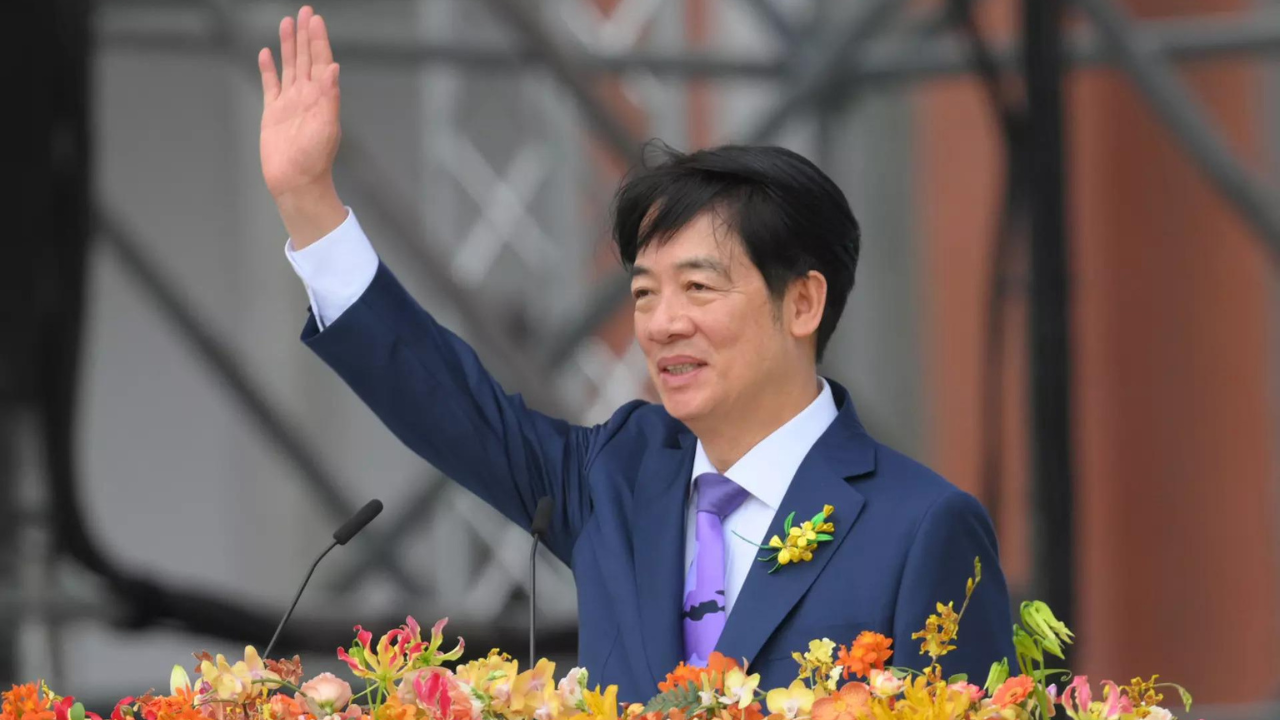NEW DELHI: Lai Ching-te assumed the role of Taiwan’s new president on Monday, facing deeply suspicious China that believes he is a “separatist” and a divided parliament with an opposition ready to challenge his leadership. Lai, who served as vice president under Tsai Ing-wen for the past four years, was sworn in to the presidential office in central Taipei.
In his inauguration speech, Ching-te said that peace is the only option and Taiwan will make no concessions on democracy and freedom, calling on China to stop its military and political threats.
China should jointly shoulder the responsibility with Taiwan to ensure peace to ensure the world is without the fear of war breaking out, Lai added.
Lai donned a purple tie symbolizing a native butterfly and a yellow pin representing mustard flowers common in Taiwan’s fields. He received two seals symbolizing presidential power from the parliament speaker: the seal of the Republic of China and the seal of honor, both brought to Taiwan in 1949 after the Republican government fled following defeat in the Chinese civil war.
Beijing, which views Taiwan as its territory and has not renounced the use of force to control the island, remains suspicious of Lai, labeling him a “separatist.” Despite Lai’s offers for talks, which have been rejected, he maintains that only Taiwan’s people can decide their future.
Since Lai’s election victory in January, Taiwan has experienced ongoing pressure from China, including frequent air and naval activities near the island. On Monday, Taiwan’s defense ministry reported that six Chinese aircraft had crossed the Taiwan Strait’s median line, with at least one aircraft approaching within 43 nautical miles of Keelung.
The inauguration ceremony saw the attendance of former US officials sent by President Joe Biden, lawmakers from countries such as Japan, Germany, and Canada, and leaders from the 12 countries maintaining formal diplomatic ties with Taiwan, including Paraguay’s President Santiago Pena.
US secretary of state Antony Blinken congratulated Lai, and highlighted the United States’ commitment to advancing shared interests, deepening the longstanding unofficial relationship, and maintaining peace across the Taiwan Strait.
Last week, China’s Taiwan Affairs Office demanded Lai choose between peaceful development or confrontation. Chinese state media did not immediately cover Lai’s swearing-in. However, the Global Times, a state-backed newspaper, suggested Lai might become increasingly provocative, warning of long-term challenges in cross-strait relations.
Domestically, Lai faces significant challenges as his Democratic Progressive Party lost its parliamentary majority in January. Recent parliamentary sessions have been marked by disputes, with lawmakers engaging in physical altercations over proposed reforms. Further conflicts are anticipated as discussions resume.
(With agency inputs)
In his inauguration speech, Ching-te said that peace is the only option and Taiwan will make no concessions on democracy and freedom, calling on China to stop its military and political threats.
China should jointly shoulder the responsibility with Taiwan to ensure peace to ensure the world is without the fear of war breaking out, Lai added.
Lai donned a purple tie symbolizing a native butterfly and a yellow pin representing mustard flowers common in Taiwan’s fields. He received two seals symbolizing presidential power from the parliament speaker: the seal of the Republic of China and the seal of honor, both brought to Taiwan in 1949 after the Republican government fled following defeat in the Chinese civil war.
Beijing, which views Taiwan as its territory and has not renounced the use of force to control the island, remains suspicious of Lai, labeling him a “separatist.” Despite Lai’s offers for talks, which have been rejected, he maintains that only Taiwan’s people can decide their future.
Since Lai’s election victory in January, Taiwan has experienced ongoing pressure from China, including frequent air and naval activities near the island. On Monday, Taiwan’s defense ministry reported that six Chinese aircraft had crossed the Taiwan Strait’s median line, with at least one aircraft approaching within 43 nautical miles of Keelung.
The inauguration ceremony saw the attendance of former US officials sent by President Joe Biden, lawmakers from countries such as Japan, Germany, and Canada, and leaders from the 12 countries maintaining formal diplomatic ties with Taiwan, including Paraguay’s President Santiago Pena.
US secretary of state Antony Blinken congratulated Lai, and highlighted the United States’ commitment to advancing shared interests, deepening the longstanding unofficial relationship, and maintaining peace across the Taiwan Strait.
Last week, China’s Taiwan Affairs Office demanded Lai choose between peaceful development or confrontation. Chinese state media did not immediately cover Lai’s swearing-in. However, the Global Times, a state-backed newspaper, suggested Lai might become increasingly provocative, warning of long-term challenges in cross-strait relations.
Domestically, Lai faces significant challenges as his Democratic Progressive Party lost its parliamentary majority in January. Recent parliamentary sessions have been marked by disputes, with lawmakers engaging in physical altercations over proposed reforms. Further conflicts are anticipated as discussions resume.
(With agency inputs)
